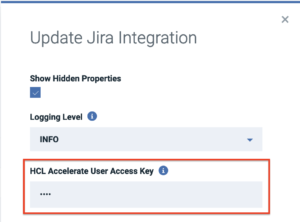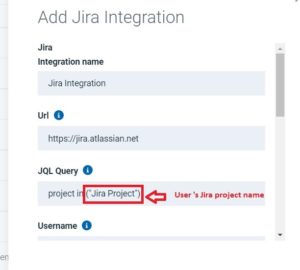Quick Info
What’s New?
User can add any JQL query while integrating the plugin as per requirements .Description
Jira is an issue tracking product, developed by Atlassian. The Jira plugin provides an integration with Jira to import and work with Jira work items.Quick Info
ucv-ext-jira:2.3.17.tar
Uploaded: 04-Apr-2024 10:17
Pull Command
docker pull hclcr.io/accelerate/ucv-ext-jira:2.2.1Release Notes
ucv-ext-jira:2.3.14.tar
Uploaded: 19-Feb-2024 07:03
Pull Command
docker pull hclcr.io/accelerate/ucv-ext-jira:2.3.14Release Notes
ucv-ext-jira:2.3.12.tar
Uploaded: 11-Jan-2024 10:24
Pull Command
docker pull hclcr.io/accelerate/ucv-ext-jira:2.3.12Release Notes
ucv-ext-jira:2.3.10.tar
Uploaded: 26-Sep-2023 12:15
Pull Command
docker pull hclcr.io/accelerate/ucv-ext-jira:2.3.10Release Notes
ucv-ext-jira:2.3.9.tar
Uploaded: 13-Sep-2023 10:45
Pull Command
docker pull hclcr.io/accelerate/ucv-ext-jira:2.3.9Release Notes
ucv-ext-jira:2.3.6.tar
Uploaded: 01-Aug-2023 05:34
Pull Command
docker pull hclcr.io/accelerate/ucv-ext-jira:2.3.6Release Notes
ucv-ext-jira:2.3.1.tar
Uploaded: 06-Mar-2023 08:27
Pull Command
docker pull hclcr.io/accelerate/ucv-ext-jira:2.3.1Release Notes
ucv-ext-jira:2.2.9.tar
Uploaded: 14-Feb-2023 11:11
Pull Command
docker pull hclcr.io/accelerate/ucv-ext-jira:2.2.9Release Notes
ucv-ext-jira:2.2.8.tar
Uploaded: 26-Sep-2022 11:27
Pull Command
docker pull hclcr.io/accelerate/ucv-ext-jira:2.2.8Release Notes
ucv-ext-jira:2.2.7.tar
Uploaded: 08-Sep-2022 12:42
Pull Command
docker pull hclcr.io/accelerate/ucv-ext-jira:2.2.7Release Notes
ucv-ext-jira:2.2.6.tar
Uploaded: 24-Aug-2022 08:28
Pull Command
docker pull hclcr.io/accelerate/ucv-ext-jira:2.2.6Release Notes
ucv-ext-jira:2.2.5.tar
Uploaded: 02-Aug-2022 05:43
Pull Command
docker pull hclcr.io/accelerate/ucv-ext-jira:2.2.5Release Notes
ucv-ext-jira:2.2.4.tar
Uploaded: 22-Apr-2022 10:53
Pull Command
docker pull hclcr.io/accelerate/ucv-ext-jira:2.2.4Release Notes
ucv-ext-jira:2.2.1.tar
Uploaded: 09-Mar-2022 14:04
Pull Command
docker pull hclcr.io/accelerate/ucv-ext-jira:2.2.1Release Notes
ucv-ext-jira:1.1.95.tar
Uploaded: 28-Feb-2022 10:27
Pull Command
docker pull hclcr.io/accelerate/ucv-ext-jira:1.1.95Release Notes
ucv-ext-jira:1.1.94.tar
Uploaded: 28-Feb-2022 09:17
Pull Command
docker pull hclcr.io/accelerate/ucv-ext-jira:1.1.94Release Notes
ucv-ext-jira:1.1.89.tar
Uploaded: 24-Jan-2022 06:49
Pull Command
docker pull hclcr.io/accelerate/ucv-ext-jira:1.1.89Release Notes
ucv-ext-jira:1.0.83.tar
Uploaded: 03-Dec-2021 06:29
Pull Command
docker pull hclcr.io/accelerate/ucv-ext-jira:1.0.83Release Notes
ucv-ext-jira:1.0.80.tar
Uploaded: 27-Oct-2021 13:41
Pull Command
docker pull hclcr.io/accelerate/ucv-ext-jira:1.0.80Release Notes
ucv-ext-jira:1.0.74.tar
Uploaded: 29-Sep-2021 05:49
Pull Command
docker pull hclcr.io/accelerate/ucv-ext-jira:1.0.74Release Notes
ucv-ext-jira:1.0.65.tar
Uploaded: 19-Aug-2021 12:30
Pull Command
docker pull hclcr.io/accelerate/ucv-ext-jira:1.0.65Release Notes
ucv-ext-jira:1.0.64.tar
Uploaded: 11-Aug-2021 06:52
Pull Command
docker pull hclcr.io/accelerate/ucv-ext-jira:1.0.64Release Notes
ucv-ext-jira:1.0.52.tar
Uploaded: 06-Jul-2021 08:12
Pull Command
docker pull hclcr.io/accelerate/ucv-ext-jira:1.0.52Release Notes
ucv-ext-jira:1.0.51.tar
Uploaded: 11-Jun-2021 14:02
Pull Command
docker pull hclcr.io/accelerate/ucv-ext-jira:1.0.51Release Notes
ucv-ext-jira:1.0.50.tar
Uploaded: 28-May-2021 05:42
Pull Command
docker pull hclcr.io/accelerate/ucv-ext-jira:1.0.50Release Notes
ucv-ext-jira:1.0.49.tar
Uploaded: 03-May-2021 13:32
Pull Command
docker pull hclcr.io/accelerate/ucv-ext-jira:1.0.49Release Notes
Summary
The Jira plugin provides for integration with a Jira server. This plugin imports Jira issues and saves them as HCL DevOps Velocity issues. Data between the Jira server and the HCL DevOps Velocity server is synchronized every five minutes.
Compatibility
This plugin requires HCL DevOps Velocity version 2.0 or later.
Upgrade notes
Beginning with HCL DevOps Velocity version 2.4.0 users must enter a user access key is required to connect with the HCL DevOps Velocity server. If you are upgrading from a previous version, you must obtain and add the key to the HCL DevOps Velocity User Access Key configuration property. If the user access key is not added, the integration fails.

JQL Query
User can add their own customized JQL query for fetching specific issues . For further reference regarding JQL queries and how to use them , please follow the link https://confluence.atlassian.com/jirasoftwareserver0820/advanced-searching-1095249245.html

History
The following table describes the changes made in each plugin version.
| Version | Description |
|---|---|
| 2.2.5 | Added Project keys, Moved JQL to hidden properties. |
| 2.1.1 | Added JQL Query, Removed Project Keys. |
| 1.1.95 | Graphiql Performance Improved, Raw Issue Size Reduced. |
| 1.1.94 | Reducing Vulnerabilities. |
| 1.1.89 | Initial Sync Data added, Payload size more than 10MB data issue resolved, Reintroduce base path, Labels updated, Debug logs added. |
| 1.0.80 | Enhanced support for epics/ features. |
| 1.0.74 | Minor enhancements. |
| 1.0.64 | ReSync support added (support starts with HCL DevOps Velocity version 2.4.4 or later). Auto-generated User Access Key support added (support starts with HCL DevOps Velocity version 2.4.0 or later). |
| 1.0.51 | Minor enhancements. |
| 1.0.50 | Jira rate limit issue fix. |
| 1.0.49 | Minor bug fix. |
| 1.0.39 |
Usage
To use the Jira plugin, the plugin must be loaded and an instance created before you can configure the plugin integration. You define configuration properties in the user interface or in a JSON file.
Integration type
The Jira plugin supports scheduled events integration which are listed in the following table.
| Name | Description |
|---|---|
| SyncJiraDataEvent | Synchronize data from a Jira server. |
Integration
There are two methods to integrate the plugin:
- Using the user interface
- Using a JSON file
The tables in the Configuration properties topic describe the properties used to define the integration.
Using the user interface
- From the Plugins page, click Settings > Integrations > Plugins.
- Under the Action column for the plugin, click Add Integration.
- On the Add Integration page enter values for the fields used to configure the integration and define communication.
- Click Save.
Using a JSON file
The JSON file contains the information for creating a value stream. Within the JSON file is a section for integrations. It is in this section that plugin properties can be defined.
- From a value stream page, download the value stream map. The value stream map is a JSON file used to define integrations.
- Edit the JSON file to include the plugin configuration properties.
- Save and upload the JSON file. This replaces the current JSON file with the new content.
- View the new integration on the Integrations page.
Minimum permission to integrate with Jira
The Jira Account used to generate the access token must have access to the project which is being integrated with HCL DevOps Velocity.
Configuration Properties
The following tables describe the properties used to configure the integration. Each table contains the field name when using the user interface and the property name when using a JSON file.
- The General Configuration Properties table describes configuration properties used by all plugin integrations.
- The Jira Configuration Properties table describes the configuration properties that define the connection and communications with the Jira server.
Some properties might not be displayed in the user interface, to see all properties enable the Show Hidden Properties field.
| Name | Description | Required | Property Name |
|---|---|---|---|
| NA | The version of the plugin that you want to use. To view available versions, click the Version History tab. If a value is not specified, the version named latest is used. | No | image |
| Integration Name | An assigned name to the value stream. | Yes | name |
| Logging Level | The level of Log4j messages to display in the log file. Valid values are: all, debug, info, warn, error, fatal, off, and trace. | No | loggingLevel |
| NA | List of plugin configuration properties used to connect and communicate with the Jira server. Enclose the properties within braces. | Yes | properties |
| The name of the tenant. | Yes | tenant_id | |
| NA | Unique identifier assigned to the plugin. The value for the Jira plugin is ucv-ext-jira. |
Yes | type |
| HCL DevOps Velocity User Access Key | An auto-generated user access key provides credentials for communicating with the HCL DevOps Velocity server. | Yes | NA |
| Name | Type | Description | Required |
|---|---|---|---|
| Personal Access Token | String | Personal Access Token to authenticate with the Jira server. If supplied, Username and Password will be ignored. NOTE: For Jira cloud version provide username and password. For Jira server provide personal access token. |
No |
| Access Token | String | The Access Token for OAuth authentication. If supplied, Personal access token, Username and Password will be ignored. | No |
| Access Token Secret | String | The Access Token Secret for OAuth authentication. If supplied, Personal access token, Username and Password will be ignored. | No |
| Consumer Key | String | The consumer key for oauth authentication with the Jira server. If supplied, Personal access token, Username and Password will be ignored. | No |
| Consumer Secret | String | The consumer secret for oauth authentication with the Jira server. If supplied, Personal access token, Username and Password will be ignored. | No |
| jiraProjects | Array | A list of Jira Project Keys separated by commas. Example: PROJ1, PROJ2′ | Yes |
| JQL Query | String | JQL Query has higher priority than Project Keys . If JQL Query is added , Project Keys will not work . | No |
| Proxy Server | String | The URL of the proxy server including the port number. | No |
| Proxy User Name | String | The user name used to authenticate with the proxy server. | No |
| Proxy Password | String | The password used to authenticate with the proxy server. | No |
| URL | String | The base URL of the Jira server. | Yes |
| User Name | String | The user name used to authenticate with the Jira server. | No |
| Password | Secure | Password to authenticate with the Jira. If supplied, Personal access token will be ignored. NOTE: For Jira cloud version the Access Token should be entered in the Password field. |
No | requestTimeout | Number | Timeout (in seconds) to apply to each request to the Jira server. Range is 10 to 150 seconds | No |
| Custom Field Mapping | Multiline | Map Jira fields to the fields expected by this server as a Name Value pair, eg: “Epic Link”: “Epic field in Jira”, “Sprint”: “Sprint field in Jira”, “Story Points”: “Story field in Jira. | Yes |
JSON code sample
The following sample code can be used as a template to define the integration within the JSON file for a value stream. Copy and paste the template into the JSON file Integration section and make the appropriate changes.
"integrations": [
{
"type": "ucv-ext-jira",
"tenant_id": "tenantid",
"name": "Jira_Plugin ",
"properties": {
"baseUrl": "jira_server_url",
"username": "jira_server_user_name",
"password": "jira_server_password",
"consumer_key": null,
"consumer_secret": null,
"access_token": null,
"access_token_secret": null,
"jiraProjects":["John-Project","John-Project 2"],
"jiraJql":"project in ("John-Project")",
"proxyServer": "proxy_server_url",
"proxyUsername": "proxy_server_user_name",
"proxyPassword": "proxy_server_password"
}
} ]Custom Field Mapping
The plugin assumes that the Jira server uses the fields names for Epics, Sprint and Story Points as ‘Epic Link’, ‘Sprint’ and Story Points’. If the Jira server uses different field names than these, then the ‘Custom Field Mapping’ plugin property can be used to map the Jira field names to the above default field names assumed by the plugin. The field names can be mapped as name value pairs.
Example of a custom field mapping:
“Epic Link”: “Epic field name in Jira server”, “Sprint”: “Sprint field name in Jira server”, “Story Points”: “Story field name in Jira server”
 Configuration Properties
Configuration Properties
